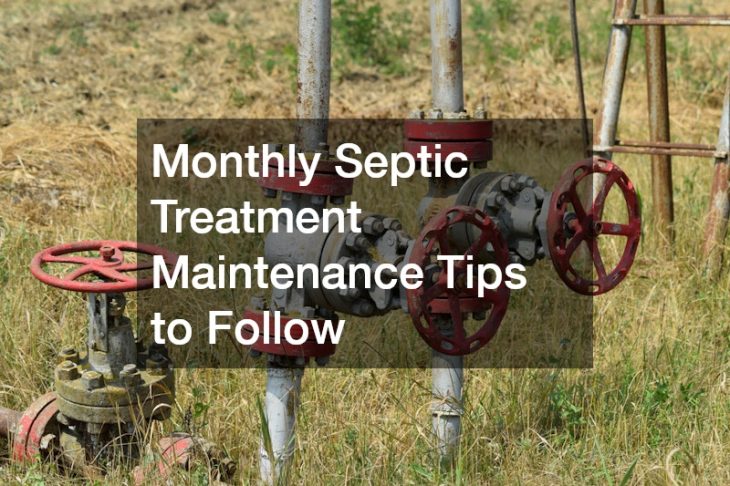
A Checklist to Help Avoid a Septic Emergency
Septic system maintenance is essential for a properly functioning home’s waste disposal system. Neglecting your septic system can lead to a costly and inconvenient septic emergency. To avoid septic-related crises, it’s essential to establish a preventive maintenance checklist and to take care of your septic system.
Assess Your Septic System and Irrigation System
Before you start your preventive maintenance checklist, it’s essential to assess the current state of your septic system and irrigation installations if you have one. This initial evaluation will provide insights into potential issues that need addressing. There are signs that your system needs attention.
Sometimes, you will smell a problem long before you can visually detect a problem. Walk around your property and sniff for foul odors. Foul smells around the septic tank or drain field could indicate a problem. Pay attention to slow drains in sinks, showers, and toilets. This may be a sign of a septic system blockage or backup.
A healthy, lush lawn above your drain field is a good sign. However, if the grass looks particularly vibrant or damp, it could indicate a septic system leak. Check for pools of water or standing water in your yard, especially near the septic tank or drain field. This can indicate a septic system failure.
Ask a Professional to Assess Your Soil

The condition of your soil plays an essential role in the function of your septic system. The type of soil in your area, its drainage capacity, and its ability to filter wastewater are critical factors. Consult a professional soil stabilization service or a septic system specialist to assess your soil properly.
A professional will conduct soil tests to determine the soil’s composition and drainage capacity. This information is essential for septic system planning and maintenance. The specialist will assess the soil’s ability to absorb and filter wastewater effectively. If drainage is a concern, they may recommend soil stabilization measures.
Based on the soil assessment, you’ll receive recommendations for maintaining the soil’s health and optimizing your septic system’s performance. You must follow any of the professional recommendations that you receive. Keeping your soil in good condition will ensure your drainage field can handle the wastewater appropriately.
Determine if You Need a Contractor
Depending on your septic system’s age and condition, you may require the services of a remodeling contractor to make necessary upgrades or repairs to avoid a septic emergency. If your septic system is approaching or exceeding its expected lifespan (typically 20-30 years), it’s advisable to consult a septic remodeling contractor for evaluation and potential upgrades.
If you’ve had multiple septic system repairs in the past, it’s a sign that your system may need substantial improvements. A contractor can assess the overall condition and recommend necessary changes. If your septic system is not efficiently handling wastewater or experiencing frequent issues, a septic contractor can assess the situation and suggest modifications. Those modifications can help you to avoid a septic emergency.
Decide if You Require Interior Design Support

While interior design is not typically associated with septic system maintenance, it’s essential to consider certain aspects of your home’s interior that can impact your septic system. Interior design can affect your septic system.
For example, if you plan to undertake bathroom or kitchen renovations that involve plumbing changes, it’s important to consult an interior contractor who understands the implications for your septic system. Interior designers can help you choose water-saving fixtures that reduce water usage and less load on your septic system, avoiding a septic emergency.
Interior designers are experts at efficient space planning. Efficient space planning can prevent the need for extensive plumbing changes, minimizing potential disruptions to your septic system during renovations. A design expert’s support can be a great way to prevent a septic emergency.
Remove All Waste from Your Home Before Starting Septic Repairs
Before any septic system repairs or maintenance activities commence, ensure your home is free from waste materials that could strain your system. If it’s been a while since your septic tank was pumped, schedule a professional disposal service to empty it. Contact a waste disposal service. This ensures that there is sufficient space for repairs without overloading the system.
You should have your septic tank pumped every three years, according to the experts, but the tank must be cleaned out before you start repairs or modifications. Minimize water usage in your home leading up to the repair work. Reducing water flow into the septic system can help prevent overflows or backups during the repair process.
If you have hazardous waste materials, such as chemicals or paints, ensure they are disposed of safely and not flushed into your septic system. You should never flush anything down your drain other than human waste. Flushing chemicals and other waste can cause a septic emergency, pollute groundwater, and have long-term environmental impacts.
Inquire About Your Tree Roots Impacting Your Plumbing

Tree roots can be a common cause of plumbing and septic system issues, especially in older homes, and can lead to a septic emergency if not addressed. If you have large trees near your plumbing or septic system, consult a tree trimming service to inspect their roots’ proximity to pipes and septic components. The trees may have to be removed to avoid a septic emergency.
If roots encroach on your plumbing, consider having a professional tree trimming service safely remove or prune the roots to prevent damage. Implement preventive measures, such as regular root maintenance or the installation of root barriers. These steps can protect your plumbing and septic system from root intrusion.
Tree roots and other landscaping can wreak havoc on your septic system and easily cause a septic emergency. As part of your septic care plan, you must ensure you are keeping up with landscaping. It is best to enlist the help of professionals to manage tree roots and other landscaping that can encroach upon your septic system.
Rent a Porta Potty During Plumbing Repairs
During septic system repairs or maintenance work that may disrupt your home’s plumbing, renting a porta potty is a good idea. A porta-potty ensures that you and your family can access restroom facilities after a septic emergency while your home’s plumbing is temporarily unavailable. Using a porta potty reduces water usage in your home, preventing the septic system from overloading during repairs.
It provides a convenient and sanitary solution for bathroom needs during the repair process. Consider contacting a luxury porta potty rental service to ensure comfort and convenience for your family during the repair period. Luxury porta-potties come with added value features that can make the porta potty far more comfortable to use.
Porta potties are a great option anytime you are having septic work done. They can be a lifesaver during a septic emergency, leaving your bathroom facilities unusable. The porta-potty company will deliver and pick up the porta-potty.
Find Out if Old Metal Pipes Can Be Recycled

You may need to replace old metal pipes if they show signs of corrosion to prevent a septic emergency. Proper disposal of the old metal pipes is essential. If your home’s plumbing system includes old metal pipes, consider whether they can be recycled when you upgrade or replace them.
Contact a metal recycling services provider to assess the feasibility of recycling your old metal pipes. Recycling metal pipes is an eco-friendly option that reduces waste and minimizes the environmental impact of disposal. You may even make some money.
Recycling is good for the environment. Metal pipe recycling keeps metal out of the landfill. Most metal is 100% recyclable. Consider recycling all material that is being replaced during a septic rehabilitation.
Purchase or Rent Plumbing Tools for Future Emergencies
It is a good idea to have the tools you will need in case of a septic emergency. Connect with a tool shop that sells and rents plumbing tools to ensure you know where to turn should you need any special tools to manage a septic emergency until the professionals can get to you. Of course, you can DIY some of the repairs independently if you are handy.
Accessing the right tools can make a big difference in how a plumbing emergency will play out. Invest in or rent basic plumbing tools like wrenches, pipe cutters, plungers, and pipe snake augers. These tools can help you address minor plumbing issues quickly.
Familiarize yourself with basic plumbing techniques and problem-solving. Understanding how to handle minor issues can prevent them from escalating into emergencies. Keep contact information for local tool shops or plumbing supply stores handy to access tools and replacement parts quickly.
Set Up Recreational Water Deliveries After Repairs Are Complete
Once your septic system repairs or maintenance are finished, it’s essential to ensure your home’s water supply is normal. Consider recreational water deliveries. For example, you should contact a pool water delivery service to provide clean and safe water for your recreational needs, such as swimming pools, hot tubs, or ponds.
Ensure that the water delivered is high quality and suitable for recreational purposes, free from contaminants that could harm your health or equipment. Recreational water deliveries expedite refilling, allowing you to resume enjoying your water-based amenities sooner. Using a water delivery service will ensure your system is not stressed.
Making simple changes can greatly impact your septic system. You can easily prevent a septic emergency by taking certain precautions, like using a water delivery service for your recreational water needs. Ensuring that your septic system is treated with TLC will prevent mishaps.
Repair All Leaks
While it is always important to repair all plumbing leaks as soon as possible, it is essential to repair leaks as soon as possible if you have a septic system. A leaky faucet can waste 10,000 gallons (about half the volume of a one-car garage) of water per year. If you have a septic system, that water fills and overwhelms your septic tank.
Any plumbing leak should be treated as an emergency. A plumbing leak can turn into a septic emergency. When the tank has no room left, and the leach field becomes overwhelmed, you could face a backup situation. Keeping all your plumbing in good condition is good for your septic system.
Plumbing leaks are not only bad for your septic system; they are bad for your home. Water damage can be costly. Of course, a leak can also mean moisture build-up, which can invite mold and mildew growth. It is best to repair leaks immediately.
Treat Your Septic System
You can purchase over-the-counter additives to flush down your toilet that will help keep your septic tank and entire system healthy. Septic systems depend on naturally occurring bacteria and enzymes to break waste down. These microorganisms play a crucial role in decomposing organic matter in septic tanks and wastewater treatment.
The over-the-counter additives contain these bacteria and enzymes, which help to ensure a healthy balance in your septic tank. Septic tanks are designed to create an anaerobic (oxygen-depleted) environment. Anaerobic bacteria thrive in this environment and are responsible for breaking down solid organic materials in the wastewater. These bacteria digest the solids and convert them into simpler compounds like sludge and gases.
Enzymes are biological catalysts that accelerate chemical reactions. In septic systems, enzymes help by breaking down complex organic compounds into smaller, more easily digestible forms, making it easier for bacteria to decompose them. Monthly treatment with these over-the-counter preparations can help to speed up decomposition and keep your tank cleaner.
Follow these guidelines to protect your septic system and avoid a septic emergency that can put you and your family at risk of not having efficient waste management. Caring for your septic system is cost-effective and can prevent unexpected failures. Learn more about managing your septic system for good health and reliability.

